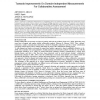Free Online Productivity Tools
i2Speak
i2Symbol
i2OCR
iTex2Img
iWeb2Print
iWeb2Shot
i2Type
iPdf2Split
iPdf2Merge
i2Bopomofo
i2Arabic
i2Style
i2Image
i2PDF
iLatex2Rtf
Sci2ools
143
click to vote
EDM
2011
2011
Towards Improvements on Domain-independent Measurements for Collaborative Assessment
Assessment on collaborative student behavior is a longstanding issue in user modeling. Nowadays thanks to the proliferation of online learning and the vast amount of data on students’ interactions this modeling issue features some alternatives. The purpose is not to depend on teachers or students assessments, which either requires management effort difficult to assume (due to some students-per-teacher ratios) or depends on individual motivations (i.e. student willingness on providing explicit feedback related to collaboration). In our research we have shown that based on frequent and regular analysis of those interactions it is feasible to obtain collaborative assessments that concurs with expert valorizations. This approach relies on data mining and machine learning techniques, which are applied to infer collaborative significant student’s characteristics such as regularity, in terms of activity and initiative, and student acknowledgment of fellow-students. The advantages of the a...
Data Mining | EDM 2011 | Learning Management Systems | Longstanding Issue | Student Acknowledgment |
Related Content
| Added | 19 Dec 2011 |
| Updated | 19 Dec 2011 |
| Type | Journal |
| Year | 2011 |
| Where | EDM |
| Authors | Antonio R. Anaya, Jesus Boticario |
Comments (0)

